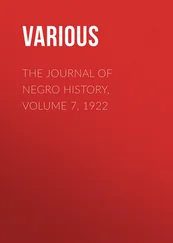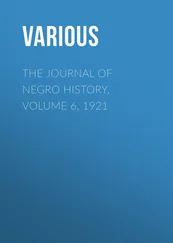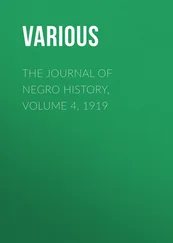Various - The Journal of Negro History, Volume 1, January 1916
Здесь есть возможность читать онлайн «Various - The Journal of Negro History, Volume 1, January 1916» — ознакомительный отрывок электронной книги совершенно бесплатно, а после прочтения отрывка купить полную версию. В некоторых случаях можно слушать аудио, скачать через торрент в формате fb2 и присутствует краткое содержание. Жанр: foreign_antique, periodic, История, foreign_edu, на английском языке. Описание произведения, (предисловие) а так же отзывы посетителей доступны на портале библиотеки ЛибКат.
- Название:The Journal of Negro History, Volume 1, January 1916
- Автор:
- Жанр:
- Год:неизвестен
- ISBN:нет данных
- Рейтинг книги:5 / 5. Голосов: 1
-
Избранное:Добавить в избранное
- Отзывы:
-
Ваша оценка:
- 100
- 1
- 2
- 3
- 4
- 5
The Journal of Negro History, Volume 1, January 1916: краткое содержание, описание и аннотация
Предлагаем к чтению аннотацию, описание, краткое содержание или предисловие (зависит от того, что написал сам автор книги «The Journal of Negro History, Volume 1, January 1916»). Если вы не нашли необходимую информацию о книге — напишите в комментариях, мы постараемся отыскать её.
The Journal of Negro History, Volume 1, January 1916 — читать онлайн ознакомительный отрывок
Ниже представлен текст книги, разбитый по страницам. Система сохранения места последней прочитанной страницы, позволяет с удобством читать онлайн бесплатно книгу «The Journal of Negro History, Volume 1, January 1916», без необходимости каждый раз заново искать на чём Вы остановились. Поставьте закладку, и сможете в любой момент перейти на страницу, на которой закончили чтение.
Интервал:
Закладка:
Ye sons of America, forbear!–Consider the dire consequences, that will attend the prosecution, against which the all-powerful God of nature holds up his hands, and loudly proclaims, desist!
In the insolence of self-consequence, we are accustomed to esteem ourselves and the Christian powers of Europe, the only civilized people on the globe; the rest without distinction, we presumptuously denominate barbarians. But, when the practices above mentioned, come to be deliberately considered–when added to these, we take a view of the proceedings of the English in the East Indies, under the direction of the late Lord Clive, and remember what happened in the streets of Bengal and Calcutta–when we likewise reflect on our American mode of driving, butchering and exterminating the poor defenceless Indians, the native and lawful proprietors of the soil–we shall acknowledge, if we possess the smallest degree of candor, that the appellation of barbarian does not belong to them alone. While we continue those practices the term christian will only be a burlesque expression, signifying no more than that it ironically denominates the rudest sect of barbarians that ever disgraced the hand of their Creator. We have the precepts of the gospel for the government of our moral deportment, in violation of which, those outrageous wrongs are committed; but they have no such meliorating influence among them, and only adhere to the simple dictates of reason, and natural religion, which they never violate.
Might not the inhabitants of Africa, with still greater justice on their side, than we have on ours, cross the Atlantic, seize our citizens, carry them into Africa, and make slaves of them, provided they were able to do it? But should this be really the case, every corner of the globe would reverberate with the sound of African oppression; so loud would be our complaint, and so "feeling our appeal" to the inhabitants of the world at large. We should represent them as a lawless, piratical set of unprincipled robbers, plunderers and villains, who basely prostituted the superior power and information, which God had given them for worthy purposes to the vilest of all ends. We should not hesitate to say that they made use of those advantages only to infringe upon every dictate of justice; to trample under foot every suggestion of principle, and to spurn, with contempt, every right of humanity.
The Algerines are reprobated all the world over, for their unlawful depredations; and stigmatized as pirates, for their unreasonable exactions from foreign nations. But, the Algerines are no greater pirates than the Americans; nor are they a race more destructive to the happiness to mankind. The depredations of the latter on the coast of Africa, and upon the Indians' Territory make the truth of this assertion manifest. The piratical depredations of the Algerines appear to be a judgment from heaven upon the nations, to punish their perfidy and atrocious violations of justice; and never did any people more justly merit the scourge than Americans, on whom it seems to fall with peculiar and reiterated violence. When they yoke our citizens to the plow, and compel them to labour in that degraded manner, they only retaliate on us for similar barbarities. For Algiers is a part of the same country, whose helpless inhabitants we are accustomed to carry away. But the English and Americans cautiously avoid engaging with a warlike people, whom they fear to attack in a manner so base and unworthy; whilst the Algerines, more generous and courageous plunderers, are not afraid to make war on brave and well-disciplined enemies, who are capable of making a gallant resistance.
Whoever examines into the conditions of the slaves in America will find them in a state of the most uncultivated rudeness. Not instructed in any kind of learning, they are grossly ignorant of all refinement, and have little else about them, belonging to the nature of civilized man, than mere form. They are strangers to almost every idea, that doth not relate to their labour or their food; and though naturally possessed of strong sagacity, and lively parts, are, in all respects, in a state of most deplorable brutality.–This is owing to the iron-hand of oppression, which ever crushes the bud of genius and binds up in chains every expansion of the human mind.–Such is their extreme ignorance that they are utterly unacquainted with the laws of the world–the injunctions of religion–their own natural rights, and the forms, ceremonies and privileges of marriage originally established by the Divinity. Accordingly they lived in open violation of the precepts of christianity and with as little formality or restrictions as the brutes of the field, unite for the purposes of procreation. Yet this is a civilized country and a most enlightened period of the world! The resplendent glory of the gospel is at hand, to conduct us in safety through the labyrinths of life. Science hath grown up to maturity, and is discovered to possess not only all the properties of solidity of strength, but likewise every ornament of elegance, and every embellishment of fancy. Philosophy hath here attained the most exalted height of elevation; and the art of government hath received such refinements among us, as hath equally astonished our friends, our enemies and ourselves. In fine, no annals are more brilliant than those of America; nor do any more luxuriantly abound with examples of exalted heroism, refined policy, and sympathetic humanity. Yet now the prospect begins to change; and all the splendor of this august assemblage, will soon be overcast by sudden and impenetrable clouds; and American greatness be obliterated and swallowed up by one enormity. Slavery diffuses the gloom, and casts around us the deepest shade of approaching darkness. No longer shall the united states of America be famed for liberty. Oppression pervades their bowels; and while they exhibit a fair exterior to the other parts of the world, they are nothing more than "painted sepulchres," containing within them nought but rottenness and corruption.
Ye voluptuous, ye opulent and great, who hold in subjection such numbers of your fellow-creatures, and suffer these things to happen–beware! Reflect on this lamentable change, that may, at a future period, take place against you. Arraigned before the almighty Sovereign of the universe, how will you answer the charge of such complicated enormity? The presence of these slaves, who have been lost, for want of your instruction, and by means of your oppression, shall make you dart deeper into the flames, to avoid their just reproaches, and seek out for an asylum, in the hidden corners of perdition.
Many persons of opulence in Virginia, and the Carolinas, treat their unhappy slaves with every circumstance of coolest neglect, and the most deliberate indifference. Surrounded with a numerous train of servants, to contribute to their personal ease, and wallowing in all the luxurious plenitude of riches, they neglect the wretched source, whence they draw this profusion. Many of their negroes, on distant estates, are left to the entire management of inhuman overseers, where they suffer for the want of that sustenance, which, at the proprietors seat of residence, is wastefully given to the dogs. It frequently happens, on these large estates, that they are not clothed, 'till winter is nearly expired; and then, the most valuable only are attended to; the young, and the labour-worn, having no other allowance, in this respect, than the tattered garments, thrown off by the more fortunate. A single peck of corn a week, or the like measure of rice, is the ordinary quantity of provision for a hard working slave; to which a small quantity of meat is occasionally, tho' rarely, added. While those miserable degraded persons thus scantily subsist, all the produce of their unwearied toil, is taken away to satiate their rapacious master. He, devoted wretch! thoughtless of the sweat and toil with which his wearied, exhausted dependents procure what he extravagantly dissipates, not contented with the ordinary luxuries of life, is, perhaps, planning, at the time, some improvement on the voluptuous art.–Thus he sets up two carriages instead of one; maintains twenty servants, when a fourth part of that number are more than sufficient to discharge the business of personal attendance; makes every animal, proper for the purpose, bleed around him, in order to supply the gluttonous profusion of his table; and generally gives away what his slaves are pining for;–those very slaves, whose labour enables him to display this liberality!–No comment is necessary, to expose the peculiar folly, ingratitude, and infamy of such execrable conduct.
Читать дальшеИнтервал:
Закладка:
Похожие книги на «The Journal of Negro History, Volume 1, January 1916»
Представляем Вашему вниманию похожие книги на «The Journal of Negro History, Volume 1, January 1916» списком для выбора. Мы отобрали схожую по названию и смыслу литературу в надежде предоставить читателям больше вариантов отыскать новые, интересные, ещё непрочитанные произведения.
Обсуждение, отзывы о книге «The Journal of Negro History, Volume 1, January 1916» и просто собственные мнения читателей. Оставьте ваши комментарии, напишите, что Вы думаете о произведении, его смысле или главных героях. Укажите что конкретно понравилось, а что нет, и почему Вы так считаете.












